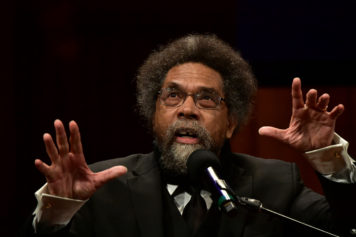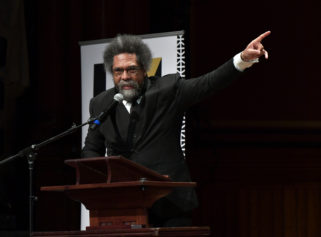CAMBRIDGE, England – Cornel West, the firebrand of American academia for almost 30 years, is causing his hosts some problems. They are on a schedule but such things barely move him, for as he saunters down the high street there are people to talk to, and no one can leave shortchanged.
Everyone, “brother” or “sister,” is indeed treated like a long lost family member. And then there is the hug; a bear-like pincer movement. There’s no escape. It happens in New York, where the professor/philosopher usually holds court. And now it’s the same in Cambridge.
The best students accord their visitors a healthy respect, but West’s week laying bare the conflicts and fissures of race and culture and activism and literature in the U.S. and Britain yielded more than that during his short residency at King’s College.
There are academics who draw a crowd, but the West phenomenon at King’s had rock star quality: the buzz, the poster beaming his image from doors and noticeboards; the back story – Harvard, Princeton, Yale, his seminal work Race Matters, his falling-in and falling-out with President Barack Obama.
Others can teach, and at Cambridge the teaching is some of the best in the world, but standing-room-only crowds came to see West perform. He performed. Approaching 60 now, he is slow of gait. But he always performs.
“Britain is in trouble,” he tells me. “Britain is in deep trouble. The privatizing is out of the control, the militarizing is out of control and the financializing is out of control. And what I mean from that is you have a cold-hearted, mean-spirited budget that the Queen just read; you have working and poor people under panic, you have this obsession with immigration that tends to scapegoat the most vulnerable rather than confront the most powerful. And it is not just black immigrants, but also our brothers and sisters from Poland and Bulgaria, Romania; right across the board.” He isn’t ranting. He doesn’t rant. He smiles, he growls gently, he leans in and whispers conspiratorily. There is an upside, he says. “Britain has a rich history of bouncing back too.”
They looked after him at King’s, he says. Incongruous in his trademark black three–piece suit, with fob watch and old-time, grey–flecked, fly-away Afro, he berthed in the understated splendor of the Rylands room in the Old Lodge. Named after Dadie Rylands, the literary scholar and theatre director educated at King’s and a fellow until his death in 1999, it was where Virginia Woolf lunched with Rylands and John Maynard Keynes. West likes such evocations. “I feel her spirit,” he says, leaning back on a chair.
Read more:Hugh Muir Guardian


